Retrieval practice: a teacher's guide
Discover why retrieval practice boosts memory, strengthens understanding, and should be a core technique in every classroom.
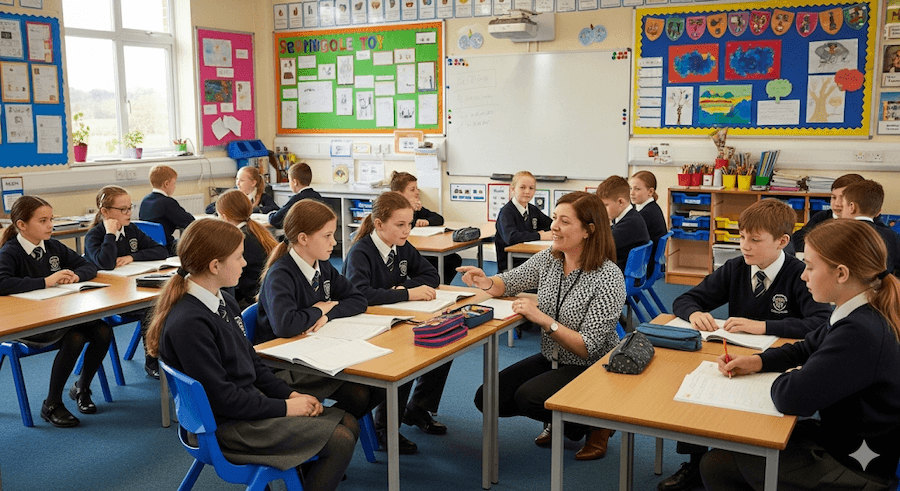

Discover why retrieval practice boosts memory, strengthens understanding, and should be a core technique in every classroom.
Retrieval practice is a teaching strategy where students test themselves on material by actively recalling information without looking at source materials. This technique transforms how knowledge moves from short-term to long-term memory by strengthening working memory retrieval pathways each time learners pull information from memory. Research shows st udents using retrieval practice retain information for weeks and months longer than those who simply re-read notes.
| Technique | Description | Implementation | Benefits |
|---|---|---|---|
| Low-Stakes Quizzing | Frequent tests without grades | Daily or weekly quizzes | Reduces test anxiety |
| Brain Dumps | Write everything remembered | Start of lesson, blank paper | Identifies gaps |
| Flashcards | Question and answer cards | Self-study or paired work | Portable, flexible |
| Retrieval Grids | Matrix of topics and questions | Structured recall activity | Covers multiple topics |
| Think-Pair-Share | Individual recall then discuss | After teacher question | Social reinforcement |
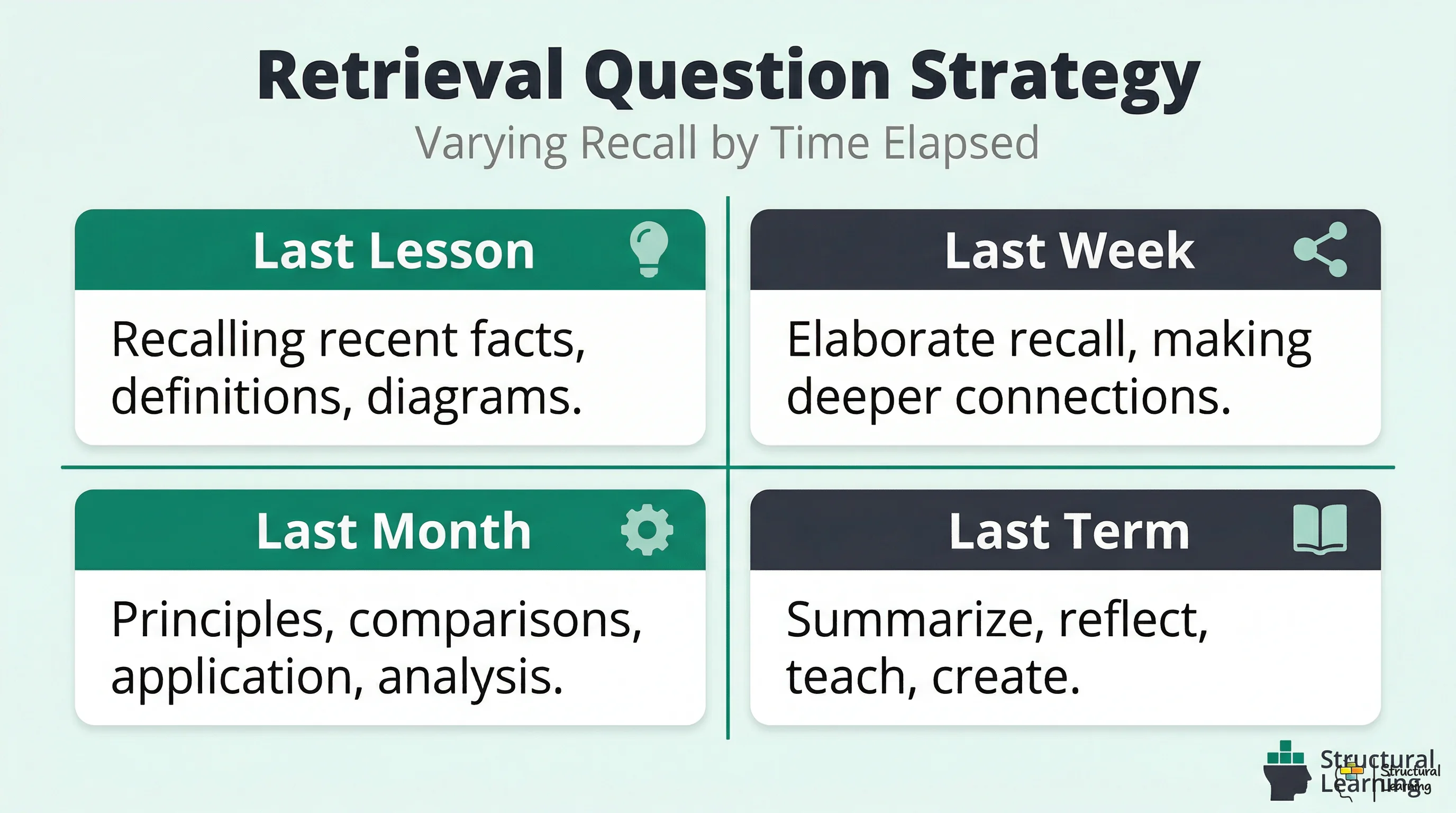
When students repeatedly test themselves on material rather than simply re-reading notes, they retain information according to the Ebbinghaus forgetting curve for weeks and months longer. This teaching strategy, known as retrieval practice, uses the testing effect to transform how knowledge moves from short-term to long-term memory through the deliberate act of recalling information without looking at source materials.
Retrieval practice stands apart from passive reading because it requires students to actively generate responses. This connects to creating their own understanding rather than simply consuming information . Research published in Science demonstrated that students using retrieval practice outperformed those using elaborate concept mapping, a finding that challenges conventional study wisdom. The process works because every time learners pull information from memory, they strengthen the neural pathways to that knowledge, making future recall faster and more reliable.
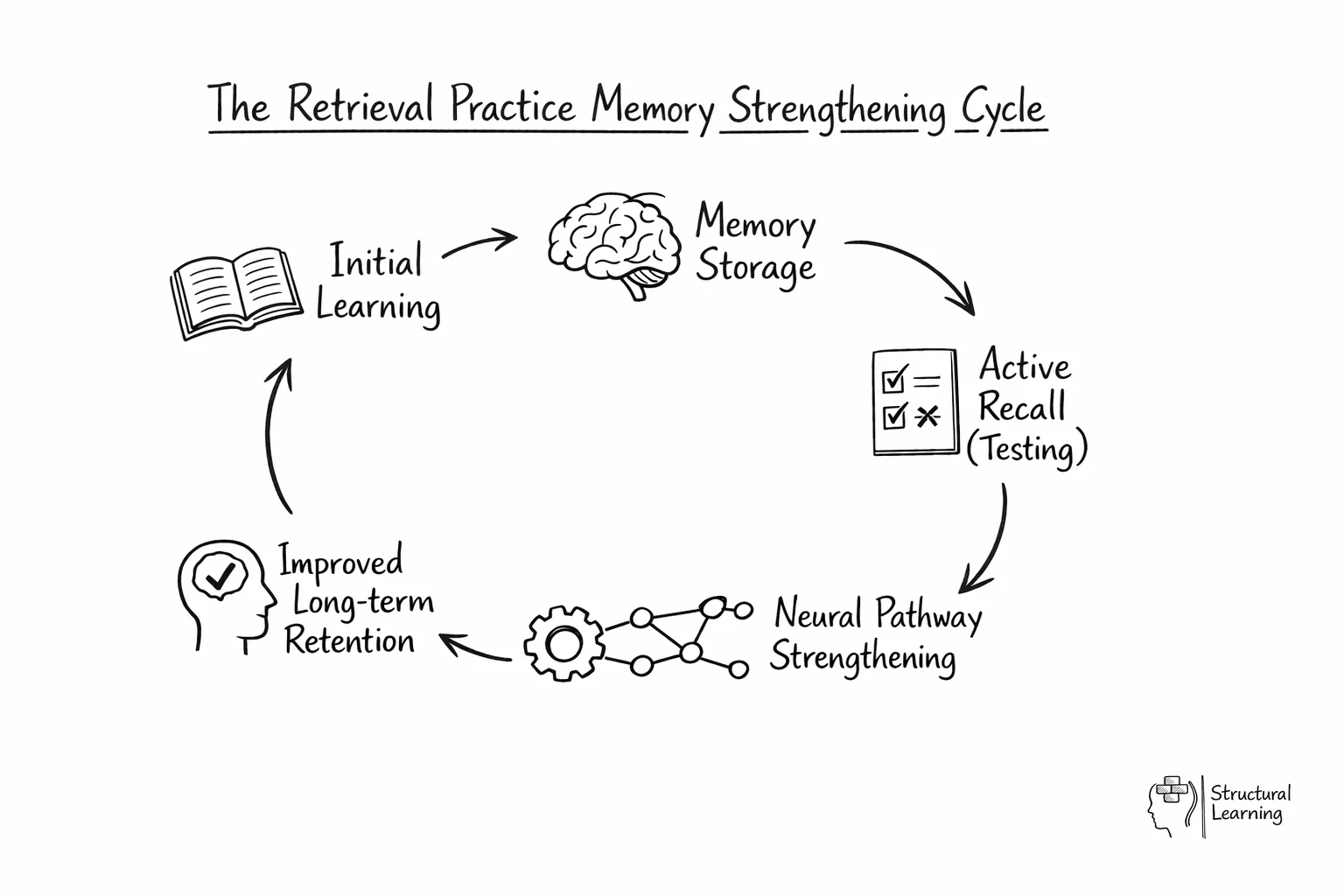
In classrooms, retrieval practice takes multiple forms. Teachers might use quick starter quizzes, retrieval as assessment with key questions, or paired discussions where students explain concepts wi thout notes. These activities push learners to develop metacognitive retrieval strategies and search their memory actively rather than recognise information passively on a page. The technique extends beyond factual recall; students applying retrieved declarative knowledge to novel problems or explaining concepts in their own words engage in deeper cognitive processing that builds transferable understanding.
The strategy creates measurable improvements in student confidence alongside academic gains. Regular low-stakes testing shows learners their growing mastery, building self-efficacy that drives further engagement. Students who initially resist testing often become advocates once they experience the lasting retention it produces.
Implementation requires thoughtful adaptation. Prior knowledge levels, subject complexity, and individual learning differences all influence how teachers structure retrieval activities. Starting with frequent, simple recall tasks and gradually spacing them out while increasing complexity helps students build retrieval strength systematically. Mixed-subject retrieval, where questions span multiple topics, further enhances the effect by forcing discrimination between concepts.
A related strategy involves testing students before they have learned the material. The pretesting effectshows that attempting to answer questions before instruction, even when students ge t them wrong, primes the brain for learning. This approach activates prior knowledge, highlights gaps in understanding, and increases attention to the subsequent teaching.
Teachers can implement retrieval practice through quick starter quizzes, key question assessments, and paired discussions where students explain concepts without notes. These activities push learners to actively search their memory rather than passively recognise information on a page. The technique works best when integrated regularly as low-stakes activities that build student confidence alongside academic gains.
Depending upon the grade levels, the Retrieval Practice condition is applied in several ways in the school environment. It can be as easy as trying to recall initial learning mentally or on a paper without involving complex materials or without reviewing the learning materials. Following are some ways to use retrieval practice in the classroom:
1. Practice tests: Teachers can ask students in a Middle School Science Classroom to write their practice questions; students can use practice from the textbook or use those provided by the teacher; they can make and share questions with their study partner, or use online sources to find questions. Teachers can also ask students to first write the correct answers to the questions in short answer format and then ask students to find the correct answers to the same questions presented as multiple-choice questions in the final or unit exam.
2. Flashcards, For students in primary grade levels, teachers can ask students to write questions on one side of the index card and answers on the other side of the card. Students can also use flashcard software systems or create flashcards on a computer and print them out.
Flashcards can be easily tailored to a particular topic, and students can recall information by looking at one side of the card and giving the answer on the other side. This makes it easier for them to test their knowledge quickly and effectively through an interactive retrieval practice exercise.
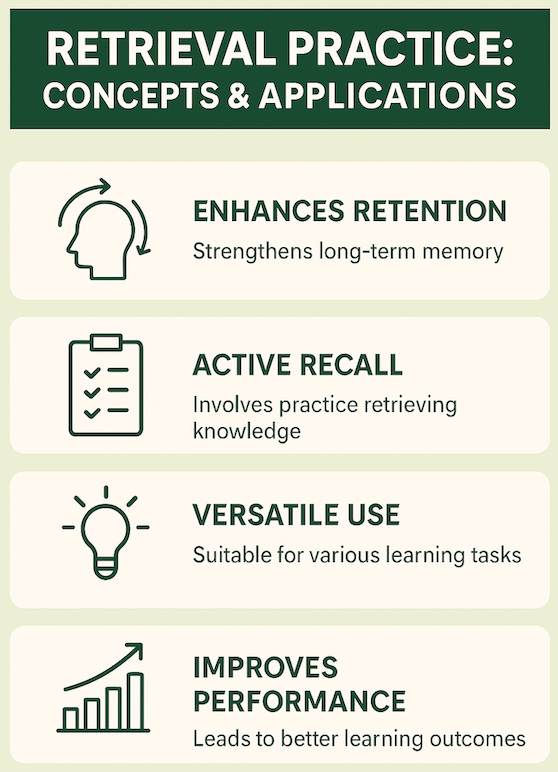
3. Writing prompts - The writing prompts technique is very effective for encouraging students to think about a specific subject and to show what they know. For example, the teacher can write an incomplete sentence on a card and ask the students to complete the sentence e.g. “A plant needs sunlight to ________".
Writing prompts present a question or a statement to the student that they have to answer, employing their knowledge of a given subject. Writing prompts can be used to gauge how well the student understands the material, and help them prepare for upcoming exams.
4. Concept maps: Karpicke Et Al. (2014) explained that c reating concept maps, is like writing prompts; but, students create a keyword map of related words instead of writing complete details of retrieval tasks. Students will create concept maps by writing the title at the top of the page and drawing a large circle. Then, they will add circles with keywords about the topic. For different grade levels, the concept maps would indicate what the students don’t know while showing what they already possess in their long term memory.
Concept maps are an effective way to improve student learning. They help to engage the student in making connections between different concepts and ideas, providing a deeper understanding of the material. Creating concept maps encourages students to think critically and form hypotheses when developing connections in their maps.
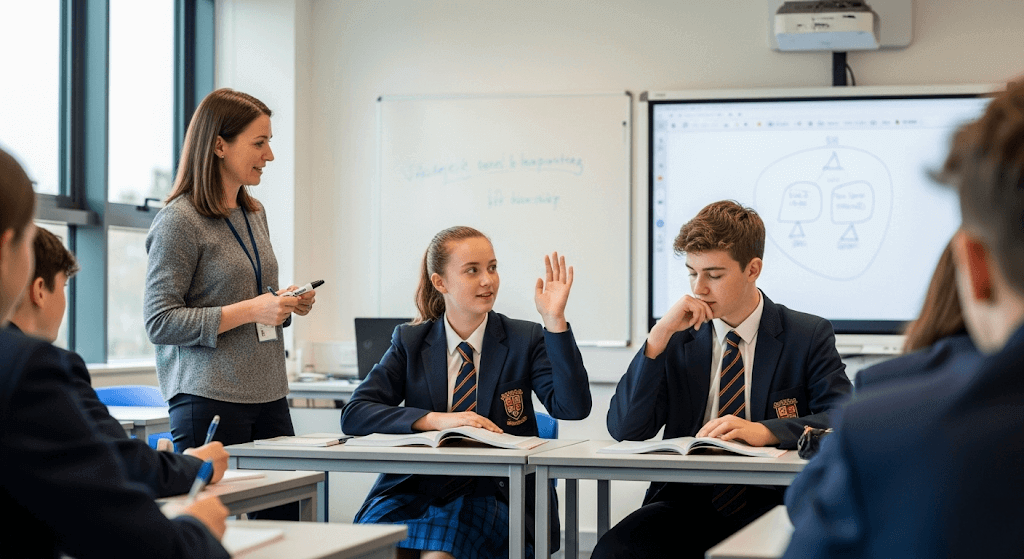 cognitive science for retrieval practice">
cognitive science for retrieval practice">
5. Elaborative Interrogation: This is an effective method, which mostly includes detailed 20 questions, which is useful retrieval practice in classroom settings. Elaborative interrogation does not involve the writing of any sort, but a student may write the answers and is better with two or more students. To use the Elaborative interrogation technique in an educational setting, the teacher would make pairs of the students, and give each pair of students a topic and several questions to ask. The main purpose is to encourage students to think deeply about the topic and recollect what they truly know.
Below are some examples:
6. Quizzes: For different grade levels, quizzes are the key ingredient that can be performed in several different ways. These can be performed individually or in groups, pairs, or as a class. Teachers can give colour cards or clickers to the students for answering or they can make the different teams in the class. While considering the level of difficulty, teachers can also use different apps and websites to ask multiple-choice questions or to conduct multiple-choice tests.
Quizzes (AI-generated retrieval quizzes) are an essential part of retrieval practice as they help to reinforce knowledge. Furthermore, quizzes can be used to track student learning and measure their understanding of concepts. This can provide invaluable feedback on how well students are absorbing the material and what areas might require further practi ce. The benefits of retrieval practice cannot be understated, and with quizzes, teachers can ensure that their students are learning the material in an effective manner.
Interestingly, when students make errors during retrieval practice, research shows that confident mistakes are actually easier to correct than tentative ones. This phenomenon, known as the hypercorrection effect, suggests that the surprise of discovering a strongly held belief is wrong creates powerful learning moments. Teachers can use this by encouraging students to commit to answers before receiving feedback.
7. Placemats: It is easy to make placemats. Worksheets provide a great way to assess prior knowledge. However, like other study strategies placemats can give great results when they are used alongside other popular methods and educational materials. Placemats are more effective for teaching elementary school children; but, there remains a risk factor for children becoming bored or just stopping to care. Therefore, placemats must be used to perform complex tasks in intentional and responsible ways.
8. Copy-cover-and-check method: To apply this retrieval practice in school environments, teachers would ask students to simply cover their lecture slides with a card, try to recall the text on the slides, and then remove the card to check. This technique provides the learning assessment without needing little-to-no extra effort before starting to apply retrieval activity in classroom settings.
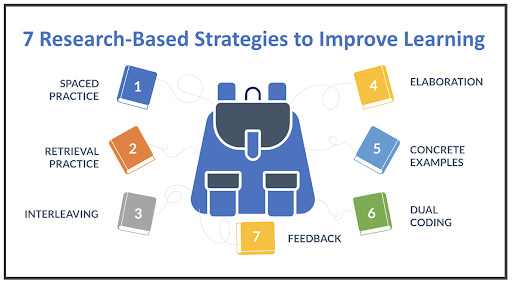
In math, students solve problems from memory without referring to formulas; in science, they diagram processes or explain phenomena without notes; in language arts, they summarise texts or identify literary devices from recall. History teachers use timeline reconstruction and cause-effect explanations, while language teachers employ vocabulary retrieval and grammar rule application. Each subject adapts retrieval practice to match its specific content demands and learning objectives.
In the field of education, the application of test-enhanced learning can be a breakthrough. Here are seven fictional examples of how this effective strategy can be integrated into various subject areas without adding extra workload for teachers:
In each of these examples, retrieval practice not only promotes long-term retention but also engages students in deeper learning practices. It's a testament to the power of this approach in enhancing learning across different subjects.
Key Insights:
For further reading, check out these academic sources: Evidence-based teaching in contact lenses education: Teaching and learning strategiesand Use of practice tests with immediate feedback in an undergraduate molecular biology course.
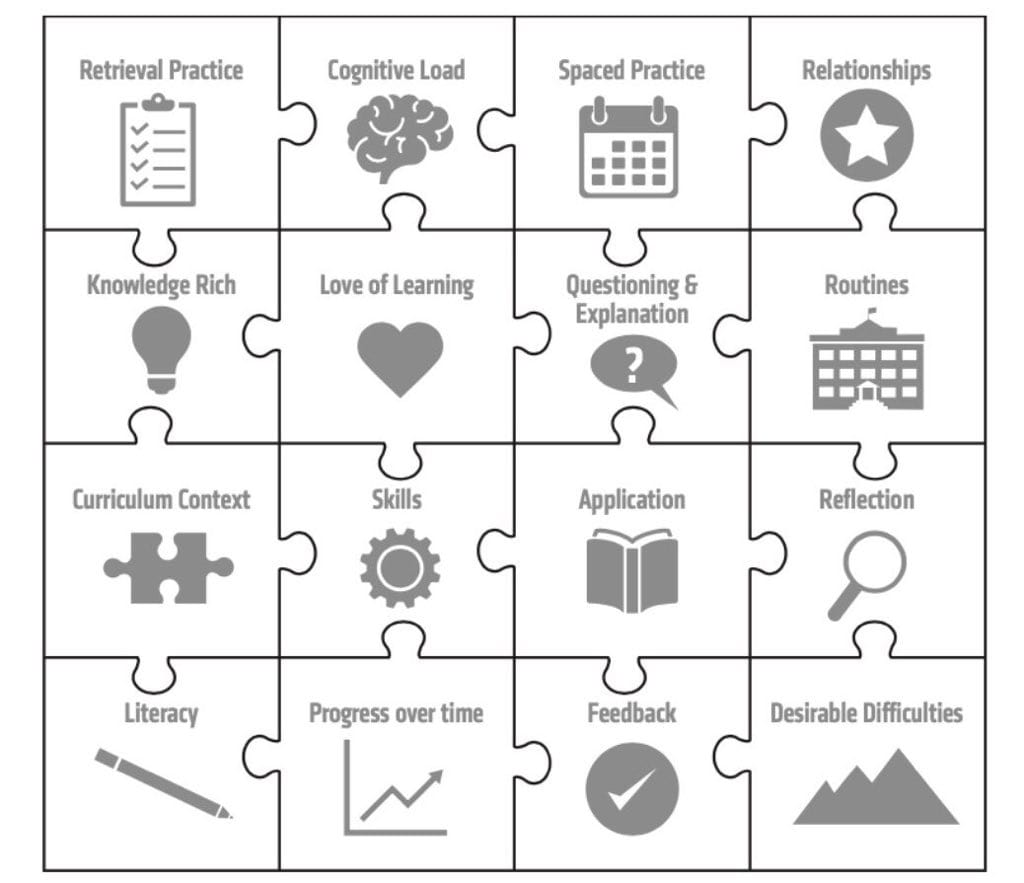
Practice testing in classrooms
Effective retrieval practice requires regular low-stakes testing that shows learners their growing mastery and builds self-efficacy. Teachers should focus on activities that demand active generation of responses rather than passive recognition, pushing students to create their own understanding. The practice becomes most powerful when students apply retrieved knowledge to novel problems or explain concepts in their own words.
If teachers know the kind of questions that will be asked in the course exam, they can also help students by providing successful retrieval practice conditions suitable for similar kinds of questions. Therefore, retrieval condition in classroom settings increases the possibility that students would successfully recall relevant information for their upcoming high-stakes exams.
Depending upon the level of difficulty, teachers can implement cued recall tests and use cue cards to remind students of complex materials and complex concepts. After using the retrieval method, it is suggested to check notes and textbooks to ensure correct and complete retrieval of the information. Cue cards strategy would rectify any mistakes, and give immediate feedback about what one knows and what one doesn't know.
Retrieval practice activity becomes more effective when it is performed along with other effective learning techniques. There are many benefits of testing but the following are some other revision techniques that can have positive effects on retrieval educational practice in making it more effective through creating new memory paths for the knowledge being recalled.
Spaced retrieval practice involves testing students on material at increasing intervals over time, which dramatically improves long-term retention compared to massed practice. The technique follows the Ebbinghaus forgetting curve, with each spaced retrieval session strengthening memory just as it begins to fade. Teachers can implement spacing by revisiting key concepts days, weeks, and months after initial learning.
Spaced retrieval practice is a popular method and a useful retrieval-based learning strategy of Cognitive Science, which means studying a topic more than once but having long gaps between learning sessions. In other words, it divides learning intotime. Research in cognitive psychology shows that the spacing effect is more beneficial for long-term, meaningful learning.
The space must be of longer duration rather than very short breaks. This strategy works better than rote learning because students get the time to forget the details before striving to access them. The best way to use spaced retrieval practice in classroom settings is to not quiz the students for some time after studying the information. Afterwards, students can be engaged in retrieval-based learning activities or they will be asked short-answer questions using flashcards or other learning techniques for practising spacing and retrieval.
Long-term retention is key when it comes to retrieval practice. Spaced retrieval practice can be a great way to help students retain information in the long-term. Studies show that having regular intervals of study, followed by taking a break before repeating the process, helps increase the student's ability to retain information. Furthermore, by lessening the duration of study periods as well as choosing which topics to revisit at random from previous sessions increases their recall capabilities even more.
Educational practice games are another way to use retrieval practice techniques. They can provide students with a fun, competitive environment in which they can learn and review material in an engaging way. Educational practice games also provide the opportunity for students to compare their ideas and knowledge against others, encouraging collaboration in the classroom.
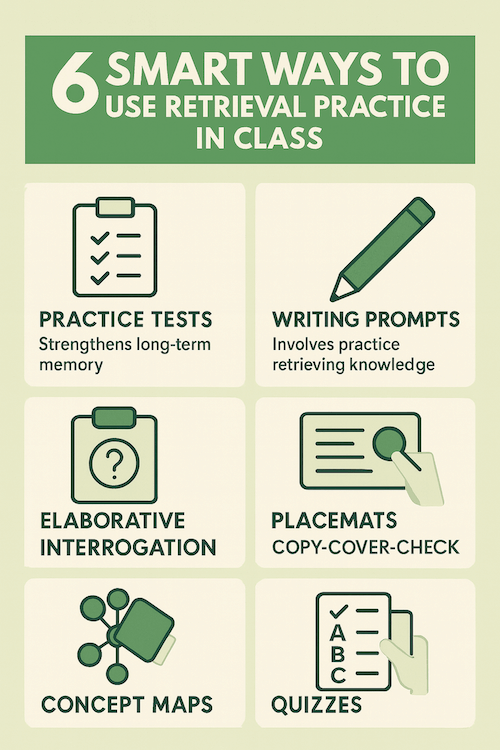
Interleaving with retrieval practice involves mixing different topics or problem types during practice sessions rather than blocking similar items together. This technique forces students to discriminate between concepts and select appropriate strategies, deepening their understanding. Teachers can interleave by including questions from multiple units in retrieval activities or alternating between different skill types within a single session.
The process of changing subjects or topics rather than just paying attention to one topic for long periods is called interleaving. For instance, rather than studying Biology for four consecutive hours, a student would study Chemistry for an hour, Biology for an hour, History for an hour, and Mathematics for an hour.
In this study time, the student would be using flashcards, making mind maps, or self-quizzing for a long-term, meaningful learning and effective retrieval practice in classroom settings.
Both spacing and interleaving techniques can help increase students' long-term meaningful learning and memory retention of important information.
When a student utilises interleaving alongside spacing and effective retrieval practice, it improves test-enhanced learning and improves the effectiveness of all three of them.
Interleaving is also a useful Retrieval based learning strategy to retain several topics into memory in a specific amount of time. Interleaving improves meaningful retrieval-based learning by mixing up topics closely related to one another. This improves students' learning process and their ability to differentiate between numerous concepts.
Retrieval practice benefits students by creating measurable improvements in both academic performance and confidence, as regular testing shows learners their growing mastery. Students those who initially resist testing often become champions once they experience the lasting retention it produces compared to passive studying. The technique helps students develop metacognitive strategies and transferable understanding that extends beyond simple factual recall.
Retrieval practice, a cornerstone of cognitive psychology, is a powerful learning strategy that has been shown to significantly enhance the learning process. Here are nine child-focused benefits of retrieval practice:
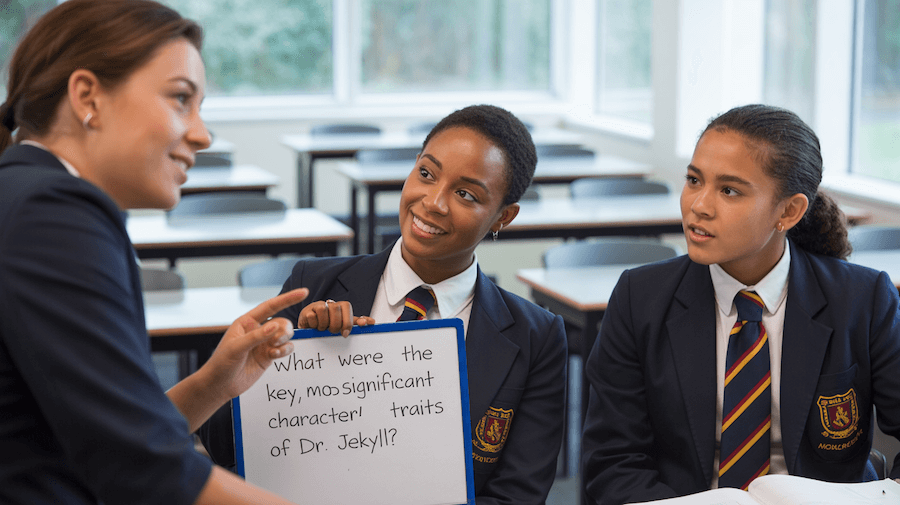
Research published in Science showed students who used retrieval practice performed better than those who did not using elaborate concept mapping, challenging conventional study wisdom. Studies consistently show that retrieval practice produces superior long-term retention compared to repeated reading or other passive study methods. The evidence spans multiple age groups and subject areas, confirming retrieval practice as one of the most reliable learning strategies available.
These studies collectively demonstrate the substantial benefits of retrieval practice in enhancing long-term retention, emphasising its effectiveness in various educational contexts and providing insights into improving teaching and learning strategies through different memory techniques and principles of psychology.
1. Repeated retrieval during learning is the key to long-term retention (Jeffrey D. Karpicke & H. Roediger, 2007)
Summary: This study demonstrates that repeated retrieval practice enhances long-term retention significantly more than repeated studying. It shows that the retrieval process is crucial for consolidating memory and promoting durable learning.
Outline: The research highlights the benefits of retrieval practice over traditional study methods, emphasising the power of testing memory to improve retention, particularly through different types of recall tests and the factors of recall involved.
2. The critical role of retrieval practice in long-term retention (H. Roediger & A. C. Butler, 2011)
Summary: Retrieval practice is shown to be a powerful enhancer of long-term retention, often surpassing repeated study sessions. Feedback further enhances these benefits, making retrieval practice a key strategy in educational settings.
Outline: The document discusses the principles of psychology behind retrieval practice, illustrating how different types of questions and retrieval processes aid in deeper learning and long-term retention.
3. Test-Enhanced Learning Taking Memory Tests Improves Long-Term Retention (H. Roediger & Jeffrey D. Karpicke, 2006)
Summary: This study confirms that taking memory tests enhances later retention more than additional study sessions, particularly over longer intervals, highlighting the testing effect's significant role in educational practice.
Outline: The research focuses on how memory tests and the retrieval process improve long-term retention, comparing different levels of memory and types of recall tests to improve learning techniques.
4. Retrieval practice enhances new learning: the forward effect of testing (Bernhard Pastötter & K. Bäuml, 2014)
Summary: Retrieval practice not only reinforces previously learned material but also enhances the learning of new information. This forward effect of testing underscores the multifaceted benefits of retrieval practice.
Outline: The paper explores the dual benefits of retrieval practice, emphasising how it aids in both consolidating existing knowledge and facilitating the acquisition of new information, making it a crucial element in adaptive teaching and effective learning strategies.
5. Putting Action into Testing: Enacted Retrieval Benefits Long-Term Retention more than Covert Retrieval (Veit Kubik, Fredrik U. Jönsson, M. De Jonge, & A. Arshamian, 2020)
Summary: This study shows that enacted retrieval, involving physical actions during recall, significantly enhances long-term retention compared to covert retrieval. It suggests different mechanisms at play in memory enhancement.
Outline: The research investigates the impact of enacted retrieval on memory, highlighting how integrating physical actions during the retrieval process can boost retention and provide deeper learning experiences, beneficial for kinesthetic learning.
The testing effect demonstrates that retrieving information from memory produces stronger learning than repeatedly studying the same material.
Pioneering research by Roediger and Karpicke (2006) revealed that students who read a passage once and then took three recall tests remembered 61% of the material after one week. In contrast, students who read the passage four times but took no tests retained only 40%. This counterintuitive finding challenged decades of educational practice focused on repeated exposure rather than active retrieval.
The testing effect operates through several cognitive mechanisms. When learners retrieve information, they reconstruct knowledge rather than simply accessing it. This reconstruction process strengthens memory traces and creates multiple retrieval routes to the same information. Failed retrieval attempts followed by feedback prove particularly powerful, as the effort involved in searching memory combined with subsequent correction creates durable learning.
Classroom applications of the testing effect extend beyond traditional assessments. Teachers implementing brief retrieval exercises at the start of lessons see improved attention and engagement. Students practising retrieval through peer teaching demonstrate deeper conceptual understanding than those who review notes silently. The effect applies equally to factual knowledge, procedural skills, and conceptual understanding across all subject areas.
The connection to long-term memory involves consolidation processes that testing uniquely activates. Each retrieval event signals to the brain that this information holds value, prompting biological changes that protect memories from interference and decay. Spaced retrieval sessions trigger reconsolidation, where memories become temporarily malleable before stabilising in stronger form. This explains why distributed practice testing produces superior retention compared to massed study sessions.
These practical steps will help you implement retrieval practice effectively across different year groups and subjects.
In Year 7 geography, Ms. Jones begins each lesson with a "retrieval wheel" - six questions displayed on the board covering content from the past month. Students spend 5 minutes answering without notes, then discuss answers in pairs before she reveals correct responses. Questions range from last lesson's river features to month-old population concepts, ensuring students maintain knowledge across multiple topics whilst building confidence through regular success.
Retrieval practice is a teaching strategy where students actively recall information from memory without looking at source materials, rather than passively re-reading notes. This technique strengthens neural pathways each time learners pull information from memory, making future recall faster and more reliable. Research shows students using retrieval practice retain information for weeks and months longer than those who simply re-read notes.
Begin with simple, low-stakes activities like quick starter quizzes, asking students key questions without their notes, or having paired discussions where students explain concepts from memory. Start with frequent, simple recall tasks and gradually space them out whilst increasing complexity to help students build retrieval strength systematically. These activities should be regular but low-pressure to build student confidence alongside academic gains.
For primary students, use flashcards with questions on one side and answers on the other, or simple writing prompts like completing sentences. For older students, try practice tests where they create their own questions, concept mapping from memory, or elaborative interrogation with detailed questioning between pairs. Mixed-subject retrieval, where questions span multiple topics, can further enhance the effect across all age groups.
Yes, retrieval practice extends well beyond factual recall and can involve students applying retrieved knowledge to novel problems or explaining concepts in their own words. This deeper cognitive processing builds transferable understanding that works across subjects. The technique helps students engage in more sophisticated thinking by forcing them to actively generate responses rather than simply consuming information.
Focus on making retrieval practice low-stakes and regular, showing students their growing mastery over time to build self-efficacy. Students who initially oppose taking tests frequently end up being more accommodating later on proponents after experiencing sustained memory retention it produces. Emphasise that these activities are for learning, not grading, and help students see measurable improvements in both their confidence and academic performance.
Findings in Science from research indicated retrieval practice enabled students to outperform their peers using elaborate concept mapping, challenging conventional study wisdom. The technique uses the testing effect and follows the Ebbinghaus forgetting curve, with students retaining information for significantly longer periods. Even pretesting, where students attempt questions before learning the material, primes the brain for better learning by activating prior knowledge and highlighting gaps in understanding.
Implementation requires thoughtful adaptation based on prior knowledge levels, subject complexity, and individual learning differences. Start with frequent, simple recall tasks for students with lower prior knowledge and gradually increase complexity whilst spacing activities further apart. Consider using different formats like visual concept maps for visual learners or verbal elaborative interrogation for students who prefer discussion-based activities.
These peer-reviewed studies provide the research foundation for the strategies discussed in this article:
Enhancing Student Learning Outcomes through AI-Driven Educational Interventions: A Comprehensive Study of Classroom Behaviour and Machine Learning Integration View study ↗
13 citations
ChunHong Yuan et al. (2025)
This study explores how artificial intelligence can personalize learning interventions by analysing classroom behaviour and student engagement patterns. For teachers interested in retrieval practice, this research demonstrates how technology might identify which students need additional practice opportunities and when to schedule them for maximum retention. The high accuracy of AI predictions suggests potential for data-driven decisions about implementing retrieval strategies in the classroom.
Immediate Versus Delayed Low-Stakes Questioning: Encouraging the Testing Effect Through Embedded Video Questions to Support Students’ Knowledge Outcomes, Self-Regulation, and Critical Thinking View study ↗
6 citations
Joseph T. Wong et al. (2024)
This research examines the timing of low-stakes quizzes embedded in online videos, directly testing a key question in retrieval practice: when should students be tested? The study compares immediate versus delayed questioning to optimize the testing effect, providing practical guidance for teachers designing online lessons or flipped classroom activities. Understanding optimal timing for retrieval opportunities can help teachers maximize student learning from video-based instruction.
From tests to tasks: how Vietnamese EFL teachers navigate washback through formative assessment practices View study ↗
6 citations
H. Phuong et al. (2025)
This study examines how teachers use formative assessment practices, including retrieval-based activities, to support learning rather than just prepare students for high-stakes tests. It offers insights into how teachers can transform traditional testing into meaningful learning tasks that promote retention and understanding. The research is particularly relevant for teachers looking to implement retrieval practice in ways that feel authentic and beneficial rather than purely evaluative.
Do teachers practice what they believe? Exploring discrepancies between teachers’ classroom management self-efficacy, self-reported strategies, and AI-observed behaviours in K-12 education View study ↗
4 citations
Yawen Shi et al. (2026)
This research investigates the gap between what teachers think they do and what they actually do in classrooms, using AI observation tools. For implementing retrieval practice, this highlights the importance of self-reflection and feedback, as teachers may believe they are providing adequate practice opportunities when actual classroom behaviour shows otherwise. The study suggests that external observation or structured self-monitoring could help teachers align their retrieval practice intentions with actual implementation.
The effectiveness of the student teams' achievement divisions in social studies learning on activeness and learning outcomes View study ↗
2 citations
Asyrul Fikri et al. (2025)
This study examines cooperative learning methods that incorporate team-based activities and assessments in social studies classrooms. The research is relevant to retrieval practice because team-based learning naturally incorporates peer teaching and retrieval opportunities as students explain concepts to each other. Teachers can use these findings to design collaborative activities that build in retrieval practice through group discussions, peer quizzing, and shared problem-solving.
Retrieval practice is a teaching strategy where students test themselves on material by actively recalling information without looking at source materials. This technique transforms how knowledge moves from short-term to long-term memory by strengthening working memory retrieval pathways each time learners pull information from memory. Research shows st udents using retrieval practice retain information for weeks and months longer than those who simply re-read notes.
| Technique | Description | Implementation | Benefits |
|---|---|---|---|
| Low-Stakes Quizzing | Frequent tests without grades | Daily or weekly quizzes | Reduces test anxiety |
| Brain Dumps | Write everything remembered | Start of lesson, blank paper | Identifies gaps |
| Flashcards | Question and answer cards | Self-study or paired work | Portable, flexible |
| Retrieval Grids | Matrix of topics and questions | Structured recall activity | Covers multiple topics |
| Think-Pair-Share | Individual recall then discuss | After teacher question | Social reinforcement |

When students repeatedly test themselves on material rather than simply re-reading notes, they retain information according to the Ebbinghaus forgetting curve for weeks and months longer. This teaching strategy, known as retrieval practice, uses the testing effect to transform how knowledge moves from short-term to long-term memory through the deliberate act of recalling information without looking at source materials.
Retrieval practice stands apart from passive reading because it requires students to actively generate responses. This connects to creating their own understanding rather than simply consuming information . Research published in Science demonstrated that students using retrieval practice outperformed those using elaborate concept mapping, a finding that challenges conventional study wisdom. The process works because every time learners pull information from memory, they strengthen the neural pathways to that knowledge, making future recall faster and more reliable.

In classrooms, retrieval practice takes multiple forms. Teachers might use quick starter quizzes, retrieval as assessment with key questions, or paired discussions where students explain concepts wi thout notes. These activities push learners to develop metacognitive retrieval strategies and search their memory actively rather than recognise information passively on a page. The technique extends beyond factual recall; students applying retrieved declarative knowledge to novel problems or explaining concepts in their own words engage in deeper cognitive processing that builds transferable understanding.
The strategy creates measurable improvements in student confidence alongside academic gains. Regular low-stakes testing shows learners their growing mastery, building self-efficacy that drives further engagement. Students who initially resist testing often become advocates once they experience the lasting retention it produces.
Implementation requires thoughtful adaptation. Prior knowledge levels, subject complexity, and individual learning differences all influence how teachers structure retrieval activities. Starting with frequent, simple recall tasks and gradually spacing them out while increasing complexity helps students build retrieval strength systematically. Mixed-subject retrieval, where questions span multiple topics, further enhances the effect by forcing discrimination between concepts.
A related strategy involves testing students before they have learned the material. The pretesting effectshows that attempting to answer questions before instruction, even when students ge t them wrong, primes the brain for learning. This approach activates prior knowledge, highlights gaps in understanding, and increases attention to the subsequent teaching.
Teachers can implement retrieval practice through quick starter quizzes, key question assessments, and paired discussions where students explain concepts without notes. These activities push learners to actively search their memory rather than passively recognise information on a page. The technique works best when integrated regularly as low-stakes activities that build student confidence alongside academic gains.
Depending upon the grade levels, the Retrieval Practice condition is applied in several ways in the school environment. It can be as easy as trying to recall initial learning mentally or on a paper without involving complex materials or without reviewing the learning materials. Following are some ways to use retrieval practice in the classroom:
1. Practice tests: Teachers can ask students in a Middle School Science Classroom to write their practice questions; students can use practice from the textbook or use those provided by the teacher; they can make and share questions with their study partner, or use online sources to find questions. Teachers can also ask students to first write the correct answers to the questions in short answer format and then ask students to find the correct answers to the same questions presented as multiple-choice questions in the final or unit exam.
2. Flashcards, For students in primary grade levels, teachers can ask students to write questions on one side of the index card and answers on the other side of the card. Students can also use flashcard software systems or create flashcards on a computer and print them out.
Flashcards can be easily tailored to a particular topic, and students can recall information by looking at one side of the card and giving the answer on the other side. This makes it easier for them to test their knowledge quickly and effectively through an interactive retrieval practice exercise.

3. Writing prompts - The writing prompts technique is very effective for encouraging students to think about a specific subject and to show what they know. For example, the teacher can write an incomplete sentence on a card and ask the students to complete the sentence e.g. “A plant needs sunlight to ________".
Writing prompts present a question or a statement to the student that they have to answer, employing their knowledge of a given subject. Writing prompts can be used to gauge how well the student understands the material, and help them prepare for upcoming exams.
4. Concept maps: Karpicke Et Al. (2014) explained that c reating concept maps, is like writing prompts; but, students create a keyword map of related words instead of writing complete details of retrieval tasks. Students will create concept maps by writing the title at the top of the page and drawing a large circle. Then, they will add circles with keywords about the topic. For different grade levels, the concept maps would indicate what the students don’t know while showing what they already possess in their long term memory.
Concept maps are an effective way to improve student learning. They help to engage the student in making connections between different concepts and ideas, providing a deeper understanding of the material. Creating concept maps encourages students to think critically and form hypotheses when developing connections in their maps.
 cognitive science for retrieval practice">
cognitive science for retrieval practice">
5. Elaborative Interrogation: This is an effective method, which mostly includes detailed 20 questions, which is useful retrieval practice in classroom settings. Elaborative interrogation does not involve the writing of any sort, but a student may write the answers and is better with two or more students. To use the Elaborative interrogation technique in an educational setting, the teacher would make pairs of the students, and give each pair of students a topic and several questions to ask. The main purpose is to encourage students to think deeply about the topic and recollect what they truly know.
Below are some examples:
6. Quizzes: For different grade levels, quizzes are the key ingredient that can be performed in several different ways. These can be performed individually or in groups, pairs, or as a class. Teachers can give colour cards or clickers to the students for answering or they can make the different teams in the class. While considering the level of difficulty, teachers can also use different apps and websites to ask multiple-choice questions or to conduct multiple-choice tests.
Quizzes (AI-generated retrieval quizzes) are an essential part of retrieval practice as they help to reinforce knowledge. Furthermore, quizzes can be used to track student learning and measure their understanding of concepts. This can provide invaluable feedback on how well students are absorbing the material and what areas might require further practi ce. The benefits of retrieval practice cannot be understated, and with quizzes, teachers can ensure that their students are learning the material in an effective manner.
Interestingly, when students make errors during retrieval practice, research shows that confident mistakes are actually easier to correct than tentative ones. This phenomenon, known as the hypercorrection effect, suggests that the surprise of discovering a strongly held belief is wrong creates powerful learning moments. Teachers can use this by encouraging students to commit to answers before receiving feedback.
7. Placemats: It is easy to make placemats. Worksheets provide a great way to assess prior knowledge. However, like other study strategies placemats can give great results when they are used alongside other popular methods and educational materials. Placemats are more effective for teaching elementary school children; but, there remains a risk factor for children becoming bored or just stopping to care. Therefore, placemats must be used to perform complex tasks in intentional and responsible ways.
8. Copy-cover-and-check method: To apply this retrieval practice in school environments, teachers would ask students to simply cover their lecture slides with a card, try to recall the text on the slides, and then remove the card to check. This technique provides the learning assessment without needing little-to-no extra effort before starting to apply retrieval activity in classroom settings.

In math, students solve problems from memory without referring to formulas; in science, they diagram processes or explain phenomena without notes; in language arts, they summarise texts or identify literary devices from recall. History teachers use timeline reconstruction and cause-effect explanations, while language teachers employ vocabulary retrieval and grammar rule application. Each subject adapts retrieval practice to match its specific content demands and learning objectives.
In the field of education, the application of test-enhanced learning can be a breakthrough. Here are seven fictional examples of how this effective strategy can be integrated into various subject areas without adding extra workload for teachers:
In each of these examples, retrieval practice not only promotes long-term retention but also engages students in deeper learning practices. It's a testament to the power of this approach in enhancing learning across different subjects.
Key Insights:
For further reading, check out these academic sources: Evidence-based teaching in contact lenses education: Teaching and learning strategiesand Use of practice tests with immediate feedback in an undergraduate molecular biology course.

Practice testing in classrooms
Effective retrieval practice requires regular low-stakes testing that shows learners their growing mastery and builds self-efficacy. Teachers should focus on activities that demand active generation of responses rather than passive recognition, pushing students to create their own understanding. The practice becomes most powerful when students apply retrieved knowledge to novel problems or explain concepts in their own words.
If teachers know the kind of questions that will be asked in the course exam, they can also help students by providing successful retrieval practice conditions suitable for similar kinds of questions. Therefore, retrieval condition in classroom settings increases the possibility that students would successfully recall relevant information for their upcoming high-stakes exams.
Depending upon the level of difficulty, teachers can implement cued recall tests and use cue cards to remind students of complex materials and complex concepts. After using the retrieval method, it is suggested to check notes and textbooks to ensure correct and complete retrieval of the information. Cue cards strategy would rectify any mistakes, and give immediate feedback about what one knows and what one doesn't know.
Retrieval practice activity becomes more effective when it is performed along with other effective learning techniques. There are many benefits of testing but the following are some other revision techniques that can have positive effects on retrieval educational practice in making it more effective through creating new memory paths for the knowledge being recalled.
Spaced retrieval practice involves testing students on material at increasing intervals over time, which dramatically improves long-term retention compared to massed practice. The technique follows the Ebbinghaus forgetting curve, with each spaced retrieval session strengthening memory just as it begins to fade. Teachers can implement spacing by revisiting key concepts days, weeks, and months after initial learning.
Spaced retrieval practice is a popular method and a useful retrieval-based learning strategy of Cognitive Science, which means studying a topic more than once but having long gaps between learning sessions. In other words, it divides learning intotime. Research in cognitive psychology shows that the spacing effect is more beneficial for long-term, meaningful learning.
The space must be of longer duration rather than very short breaks. This strategy works better than rote learning because students get the time to forget the details before striving to access them. The best way to use spaced retrieval practice in classroom settings is to not quiz the students for some time after studying the information. Afterwards, students can be engaged in retrieval-based learning activities or they will be asked short-answer questions using flashcards or other learning techniques for practising spacing and retrieval.
Long-term retention is key when it comes to retrieval practice. Spaced retrieval practice can be a great way to help students retain information in the long-term. Studies show that having regular intervals of study, followed by taking a break before repeating the process, helps increase the student's ability to retain information. Furthermore, by lessening the duration of study periods as well as choosing which topics to revisit at random from previous sessions increases their recall capabilities even more.
Educational practice games are another way to use retrieval practice techniques. They can provide students with a fun, competitive environment in which they can learn and review material in an engaging way. Educational practice games also provide the opportunity for students to compare their ideas and knowledge against others, encouraging collaboration in the classroom.

Interleaving with retrieval practice involves mixing different topics or problem types during practice sessions rather than blocking similar items together. This technique forces students to discriminate between concepts and select appropriate strategies, deepening their understanding. Teachers can interleave by including questions from multiple units in retrieval activities or alternating between different skill types within a single session.
The process of changing subjects or topics rather than just paying attention to one topic for long periods is called interleaving. For instance, rather than studying Biology for four consecutive hours, a student would study Chemistry for an hour, Biology for an hour, History for an hour, and Mathematics for an hour.
In this study time, the student would be using flashcards, making mind maps, or self-quizzing for a long-term, meaningful learning and effective retrieval practice in classroom settings.
Both spacing and interleaving techniques can help increase students' long-term meaningful learning and memory retention of important information.
When a student utilises interleaving alongside spacing and effective retrieval practice, it improves test-enhanced learning and improves the effectiveness of all three of them.
Interleaving is also a useful Retrieval based learning strategy to retain several topics into memory in a specific amount of time. Interleaving improves meaningful retrieval-based learning by mixing up topics closely related to one another. This improves students' learning process and their ability to differentiate between numerous concepts.
Retrieval practice benefits students by creating measurable improvements in both academic performance and confidence, as regular testing shows learners their growing mastery. Students those who initially resist testing often become champions once they experience the lasting retention it produces compared to passive studying. The technique helps students develop metacognitive strategies and transferable understanding that extends beyond simple factual recall.
Retrieval practice, a cornerstone of cognitive psychology, is a powerful learning strategy that has been shown to significantly enhance the learning process. Here are nine child-focused benefits of retrieval practice:

Research published in Science showed students who used retrieval practice performed better than those who did not using elaborate concept mapping, challenging conventional study wisdom. Studies consistently show that retrieval practice produces superior long-term retention compared to repeated reading or other passive study methods. The evidence spans multiple age groups and subject areas, confirming retrieval practice as one of the most reliable learning strategies available.
These studies collectively demonstrate the substantial benefits of retrieval practice in enhancing long-term retention, emphasising its effectiveness in various educational contexts and providing insights into improving teaching and learning strategies through different memory techniques and principles of psychology.
1. Repeated retrieval during learning is the key to long-term retention (Jeffrey D. Karpicke & H. Roediger, 2007)
Summary: This study demonstrates that repeated retrieval practice enhances long-term retention significantly more than repeated studying. It shows that the retrieval process is crucial for consolidating memory and promoting durable learning.
Outline: The research highlights the benefits of retrieval practice over traditional study methods, emphasising the power of testing memory to improve retention, particularly through different types of recall tests and the factors of recall involved.
2. The critical role of retrieval practice in long-term retention (H. Roediger & A. C. Butler, 2011)
Summary: Retrieval practice is shown to be a powerful enhancer of long-term retention, often surpassing repeated study sessions. Feedback further enhances these benefits, making retrieval practice a key strategy in educational settings.
Outline: The document discusses the principles of psychology behind retrieval practice, illustrating how different types of questions and retrieval processes aid in deeper learning and long-term retention.
3. Test-Enhanced Learning Taking Memory Tests Improves Long-Term Retention (H. Roediger & Jeffrey D. Karpicke, 2006)
Summary: This study confirms that taking memory tests enhances later retention more than additional study sessions, particularly over longer intervals, highlighting the testing effect's significant role in educational practice.
Outline: The research focuses on how memory tests and the retrieval process improve long-term retention, comparing different levels of memory and types of recall tests to improve learning techniques.
4. Retrieval practice enhances new learning: the forward effect of testing (Bernhard Pastötter & K. Bäuml, 2014)
Summary: Retrieval practice not only reinforces previously learned material but also enhances the learning of new information. This forward effect of testing underscores the multifaceted benefits of retrieval practice.
Outline: The paper explores the dual benefits of retrieval practice, emphasising how it aids in both consolidating existing knowledge and facilitating the acquisition of new information, making it a crucial element in adaptive teaching and effective learning strategies.
5. Putting Action into Testing: Enacted Retrieval Benefits Long-Term Retention more than Covert Retrieval (Veit Kubik, Fredrik U. Jönsson, M. De Jonge, & A. Arshamian, 2020)
Summary: This study shows that enacted retrieval, involving physical actions during recall, significantly enhances long-term retention compared to covert retrieval. It suggests different mechanisms at play in memory enhancement.
Outline: The research investigates the impact of enacted retrieval on memory, highlighting how integrating physical actions during the retrieval process can boost retention and provide deeper learning experiences, beneficial for kinesthetic learning.
The testing effect demonstrates that retrieving information from memory produces stronger learning than repeatedly studying the same material.
Pioneering research by Roediger and Karpicke (2006) revealed that students who read a passage once and then took three recall tests remembered 61% of the material after one week. In contrast, students who read the passage four times but took no tests retained only 40%. This counterintuitive finding challenged decades of educational practice focused on repeated exposure rather than active retrieval.
The testing effect operates through several cognitive mechanisms. When learners retrieve information, they reconstruct knowledge rather than simply accessing it. This reconstruction process strengthens memory traces and creates multiple retrieval routes to the same information. Failed retrieval attempts followed by feedback prove particularly powerful, as the effort involved in searching memory combined with subsequent correction creates durable learning.
Classroom applications of the testing effect extend beyond traditional assessments. Teachers implementing brief retrieval exercises at the start of lessons see improved attention and engagement. Students practising retrieval through peer teaching demonstrate deeper conceptual understanding than those who review notes silently. The effect applies equally to factual knowledge, procedural skills, and conceptual understanding across all subject areas.
The connection to long-term memory involves consolidation processes that testing uniquely activates. Each retrieval event signals to the brain that this information holds value, prompting biological changes that protect memories from interference and decay. Spaced retrieval sessions trigger reconsolidation, where memories become temporarily malleable before stabilising in stronger form. This explains why distributed practice testing produces superior retention compared to massed study sessions.
These practical steps will help you implement retrieval practice effectively across different year groups and subjects.
In Year 7 geography, Ms. Jones begins each lesson with a "retrieval wheel" - six questions displayed on the board covering content from the past month. Students spend 5 minutes answering without notes, then discuss answers in pairs before she reveals correct responses. Questions range from last lesson's river features to month-old population concepts, ensuring students maintain knowledge across multiple topics whilst building confidence through regular success.
Retrieval practice is a teaching strategy where students actively recall information from memory without looking at source materials, rather than passively re-reading notes. This technique strengthens neural pathways each time learners pull information from memory, making future recall faster and more reliable. Research shows students using retrieval practice retain information for weeks and months longer than those who simply re-read notes.
Begin with simple, low-stakes activities like quick starter quizzes, asking students key questions without their notes, or having paired discussions where students explain concepts from memory. Start with frequent, simple recall tasks and gradually space them out whilst increasing complexity to help students build retrieval strength systematically. These activities should be regular but low-pressure to build student confidence alongside academic gains.
For primary students, use flashcards with questions on one side and answers on the other, or simple writing prompts like completing sentences. For older students, try practice tests where they create their own questions, concept mapping from memory, or elaborative interrogation with detailed questioning between pairs. Mixed-subject retrieval, where questions span multiple topics, can further enhance the effect across all age groups.
Yes, retrieval practice extends well beyond factual recall and can involve students applying retrieved knowledge to novel problems or explaining concepts in their own words. This deeper cognitive processing builds transferable understanding that works across subjects. The technique helps students engage in more sophisticated thinking by forcing them to actively generate responses rather than simply consuming information.
Focus on making retrieval practice low-stakes and regular, showing students their growing mastery over time to build self-efficacy. Students who initially oppose taking tests frequently end up being more accommodating later on proponents after experiencing sustained memory retention it produces. Emphasise that these activities are for learning, not grading, and help students see measurable improvements in both their confidence and academic performance.
Findings in Science from research indicated retrieval practice enabled students to outperform their peers using elaborate concept mapping, challenging conventional study wisdom. The technique uses the testing effect and follows the Ebbinghaus forgetting curve, with students retaining information for significantly longer periods. Even pretesting, where students attempt questions before learning the material, primes the brain for better learning by activating prior knowledge and highlighting gaps in understanding.
Implementation requires thoughtful adaptation based on prior knowledge levels, subject complexity, and individual learning differences. Start with frequent, simple recall tasks for students with lower prior knowledge and gradually increase complexity whilst spacing activities further apart. Consider using different formats like visual concept maps for visual learners or verbal elaborative interrogation for students who prefer discussion-based activities.
These peer-reviewed studies provide the research foundation for the strategies discussed in this article:
Enhancing Student Learning Outcomes through AI-Driven Educational Interventions: A Comprehensive Study of Classroom Behaviour and Machine Learning Integration View study ↗
13 citations
ChunHong Yuan et al. (2025)
This study explores how artificial intelligence can personalize learning interventions by analysing classroom behaviour and student engagement patterns. For teachers interested in retrieval practice, this research demonstrates how technology might identify which students need additional practice opportunities and when to schedule them for maximum retention. The high accuracy of AI predictions suggests potential for data-driven decisions about implementing retrieval strategies in the classroom.
Immediate Versus Delayed Low-Stakes Questioning: Encouraging the Testing Effect Through Embedded Video Questions to Support Students’ Knowledge Outcomes, Self-Regulation, and Critical Thinking View study ↗
6 citations
Joseph T. Wong et al. (2024)
This research examines the timing of low-stakes quizzes embedded in online videos, directly testing a key question in retrieval practice: when should students be tested? The study compares immediate versus delayed questioning to optimize the testing effect, providing practical guidance for teachers designing online lessons or flipped classroom activities. Understanding optimal timing for retrieval opportunities can help teachers maximize student learning from video-based instruction.
From tests to tasks: how Vietnamese EFL teachers navigate washback through formative assessment practices View study ↗
6 citations
H. Phuong et al. (2025)
This study examines how teachers use formative assessment practices, including retrieval-based activities, to support learning rather than just prepare students for high-stakes tests. It offers insights into how teachers can transform traditional testing into meaningful learning tasks that promote retention and understanding. The research is particularly relevant for teachers looking to implement retrieval practice in ways that feel authentic and beneficial rather than purely evaluative.
Do teachers practice what they believe? Exploring discrepancies between teachers’ classroom management self-efficacy, self-reported strategies, and AI-observed behaviours in K-12 education View study ↗
4 citations
Yawen Shi et al. (2026)
This research investigates the gap between what teachers think they do and what they actually do in classrooms, using AI observation tools. For implementing retrieval practice, this highlights the importance of self-reflection and feedback, as teachers may believe they are providing adequate practice opportunities when actual classroom behaviour shows otherwise. The study suggests that external observation or structured self-monitoring could help teachers align their retrieval practice intentions with actual implementation.
The effectiveness of the student teams' achievement divisions in social studies learning on activeness and learning outcomes View study ↗
2 citations
Asyrul Fikri et al. (2025)
This study examines cooperative learning methods that incorporate team-based activities and assessments in social studies classrooms. The research is relevant to retrieval practice because team-based learning naturally incorporates peer teaching and retrieval opportunities as students explain concepts to each other. Teachers can use these findings to design collaborative activities that build in retrieval practice through group discussions, peer quizzing, and shared problem-solving.
{"@context":"https://schema.org","@graph":[{"@type":"Article","@id":"https://www.structural-learning.com/post/retrieval-practice-a-teachers-guide#article","headline":"Retrieval practice: a teacher's guide","description":"Discover why retrieval practice boosts memory, strengthens understanding, and should be a core technique in every classroom.","datePublished":"2021-10-06T15:09:51.516Z","dateModified":"2026-01-26T10:09:32.212Z","author":{"@type":"Person","name":"Paul Main","url":"https://www.structural-learning.com/team/paulmain","jobTitle":"Founder & Educational Consultant"},"publisher":{"@type":"Organization","name":"Structural Learning","url":"https://www.structural-learning.com","logo":{"@type":"ImageObject","url":"https://cdn.prod.website-files.com/5b69a01ba2e409e5d5e055c6/6040bf0426cb415ba2fc7882_newlogoblue.svg"}},"mainEntityOfPage":{"@type":"WebPage","@id":"https://www.structural-learning.com/post/retrieval-practice-a-teachers-guide"},"image":"https://cdn.prod.website-files.com/5b69a01ba2e409501de055d1/696a3961a0912a9f4528a341_696a395bdd3c91ea5a509a9e_retrieval-practice-a-teachers-guide-illustration.webp","wordCount":4422},{"@type":"BreadcrumbList","@id":"https://www.structural-learning.com/post/retrieval-practice-a-teachers-guide#breadcrumb","itemListElement":[{"@type":"ListItem","position":1,"name":"Home","item":"https://www.structural-learning.com/"},{"@type":"ListItem","position":2,"name":"Blog","item":"https://www.structural-learning.com/blog"},{"@type":"ListItem","position":3,"name":"Retrieval practice: a teacher's guide","item":"https://www.structural-learning.com/post/retrieval-practice-a-teachers-guide"}]},{"@type":"FAQPage","@id":"https://www.structural-learning.com/post/retrieval-practice-a-teachers-guide#faq","mainEntity":[{"@type":"Question","name":"What exactly is retrieval practice and how does it differ from traditional study methods?","acceptedAnswer":{"@type":"Answer","text":"Retrieval practice is a teaching strategy where students actively recall information from memory without looking at source materials, rather than passively re-reading notes. This technique strengthens neural pathways each time learners pull information from memory, making future recall faster and mo"}},{"@type":"Question","name":"How can I start implementing retrieval practice in my classroom tomorrow?","acceptedAnswer":{"@type":"Answer","text":"Begin with simple, low-stakes activities like quick starter quizzes, asking students key questions without their notes, or having paired discussions where students explain concepts from memory. Start with frequent, simple recall tasks and gradually space them out whilst increasing complexity to help"}},{"@type":"Question","name":"What are some practical retrieval practice techniques I can use with different age groups?","acceptedAnswer":{"@type":"Answer","text":"For primary students, use flashcards with questions on one side and answers on the other, or simple writing prompts like completing sentences. For older students, try practice tests where they create their own questions, concept mapping from memory, or elaborative interrogation with detailed questio"}},{"@type":"Question","name":"Will retrieval practice work for subjects beyond factual recall, like problem-solving or creative subjects?","acceptedAnswer":{"@type":"Answer","text":"Yes, retrieval practice extends well beyond factual recall and can involve students applying retrieved knowledge to novel problems or explaining concepts in their own words. This deeper cognitive processing builds transferable understanding that works across subjects. The technique helps students en"}},{"@type":"Question","name":"How do I convince students who resist testing that retrieval practice will benefit them?","acceptedAnswer":{"@type":"Answer","text":"Focus on making retrieval practice low-stakes and regular,"}}]}]}